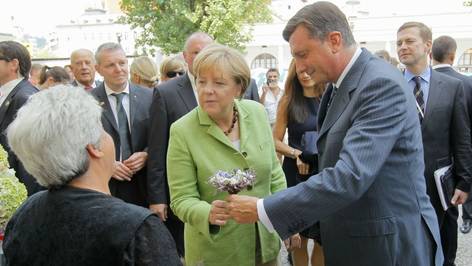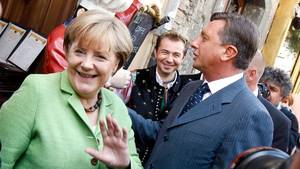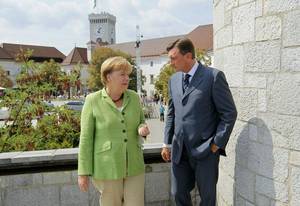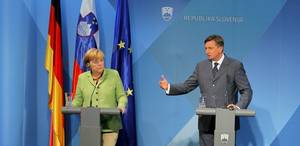NEWS
Prime Minister Pahor and German Chancellor Merkel further strengthen German-Slovenian friendship and economic relations between the two countries
The Slovenian Prime Minister, Borut Pahor, played host today to the German Chancellor, Angela Merkel, who was paying her first working visit to Slovenia. After a short walk through the centre of the capital, Chancellor Merkel and Prime Minister Pahor met for a working lunch at Ljubljana Castle where the main part of the meeting took place. Prime Minister Pahor first thanked Chancellor Merkel for her visit to Slovenia, which he considered extremely important. He then briefly presented the current economic situation in Slovenia to her, and pointed out that his government's primary objective is to remain within the Eurogroup's healthy nucleus.
Later in the conversation, Prime Minister Pahor confirmed that Slovenia has already adopted a series of measures aimed at meeting the commitments of the Euro Plus Pact, which will serve to increase competitiveness, promote employment and have a positive effect on fiscal sustainability and stability. "The current conditions, neither economic nor political, are favourable for the implementation of these measures," explained Prime Minister Pahor who went on to say that fiscal sustainability is of vital importance for Slovenia, which was the reason why the government, following the rejection of the pension reform in referendum, proposed that the budget be revised. The prime minister also added that the main focus for Slovenia is to increase competitiveness and to improve the business environment as part of the process for which the intended programme of measures is already being implemented.
(Photo: Stanko Gruden/SPA, source: GCO)
After the working lunch, Prime Minister Pahor and Chancellor Merkel delivered statements to the press; Prime Minister Pahor stressed the following: "It is my wish that the excellent relations that exist between our two countries are, in future, established as special relations between two countries and nations that share many complementary characteristics, interests and goals. In particular, both countries share a mutual respect for each other and a desire to cooperate sincerely for the common and European good." Prime Minister Pahor went on to recall the times when Slovenia was in the process of gaining independence and the unselfish help extended by influential countries to Slovenia upon its entry into the international community. I should say, without being too sentimental, that we will never forget the role that Germany played in the protection of the people's right to self-determination during that era of international change and the fall of the Berlin wall. Not least for the fact that Berlin at no point demanded nor expected any favour in return for this support. Among other things, this made the Slovenian-German friendship run even deeper and brought our traits and aspirations even closer.
(Photo: Daniel Novakovič/SPA, source: GCO)
In his statement, Prime Minister Pahor also pointed out Germany's importance, explaining that it is one of Slovenia's most important political and economic partners. With almost a 20 per cent share of total trade volumes, Germany is key to Slovenia's economic development. This also proved to be the case during the recession when trade volumes decreased by as much as a fifth, a fact which greatly exacerbated the economic crisis in Slovenia. With the beginnings of a recovery being observed in Berlin and Ljubljana, total trade volumes increased by more than a quarter to EUR 3.5 billion for the first five months of the year. During this period, Slovenian exports to Germany increased by almost a third. Germany is the fifth largest investor in Slovenia's economy.
In their statement to the press, the Prime Minister and the Chancellor also presented the Declaration on enhanced cooperation in areas of common interest. In this respect, Prime Minister Pahor said: "Through this declaration, both governments assume responsibility for maintaining excellent overall relations, particularly with regard to enhanced cooperation in seeking common solutions for the eurozone and the EU and in exchanging views on the situation in the Western Balkans.
(Photo: Stanko Gruden/SPA, source: GCO)
Prime Minister Pahor also expressed his approval of the recent proposal put forward by Chancellor Merkel and President Sarkozy for a eurozone economic government and outlined his personal take on the issue: "Owing to the challenges presented by the global recession, the European Union — and particularly the Eurogroup as its financial foundation — is around half of the way to achieving the changes required to become a successful and effective partner in the global community. I personally believe that the proposal put forward by Angela and Nicolas is the right course of action to take and, in my opinion, time will surely show the need for greater political courage. In the future, there will need to be a 'united countries of Europe' or the European idea will lose its strength and inspiration for peace and well-being across the old continent. This is true, in particular, for the Eurogroup countries. In my opinion, it would be impossible in this situation to pioneer a successful monetary policy while taking 17 different fiscal and tax policies into account, and their coordination would not be a sufficient measure for success. I am saying this is a long-term view, but even on the longest journey a first step needs to be taken. The proposals from Berlin and Paris are steps in this direction."
Prime Minister Pahor concluded his statement to the press by highlighting the importance of the Brdo Process which was welcomed also by the German side.
Prime Minister Pahor described it as the only regional institution convened on a Slovenian-Croatian initiative whose results produce symbolic and tangible effects in the region.
In her statement to the press, Chancellor Merkel thanked her host, Prime Minister Pahor, for the invitation and said that Prime Minister Pahor, like herself, is fully committed to the European issue: "Only in this way can we become a strong Europe. It is therefore important that we unite in the Euro Plus project. Chancellor Merkel commended Slovenia for the exceptional developments it has made since independence and assessed the visit positively in light of the signed declaration, which is not just important for the strengthening of relations between the two countries, but also for its actual implementation proposals. Chancellor Merkel also praised Prime Minister Pahor for his brave decision to solve the border conflict with Croatia. Chancellor Merkel concluded with the words: "Through its objectives and reforms, Slovenia has clearly demonstrated that it wants to be among the more developed countries in the eurozone. I think that this is the road that should be followed by all EU member states."








